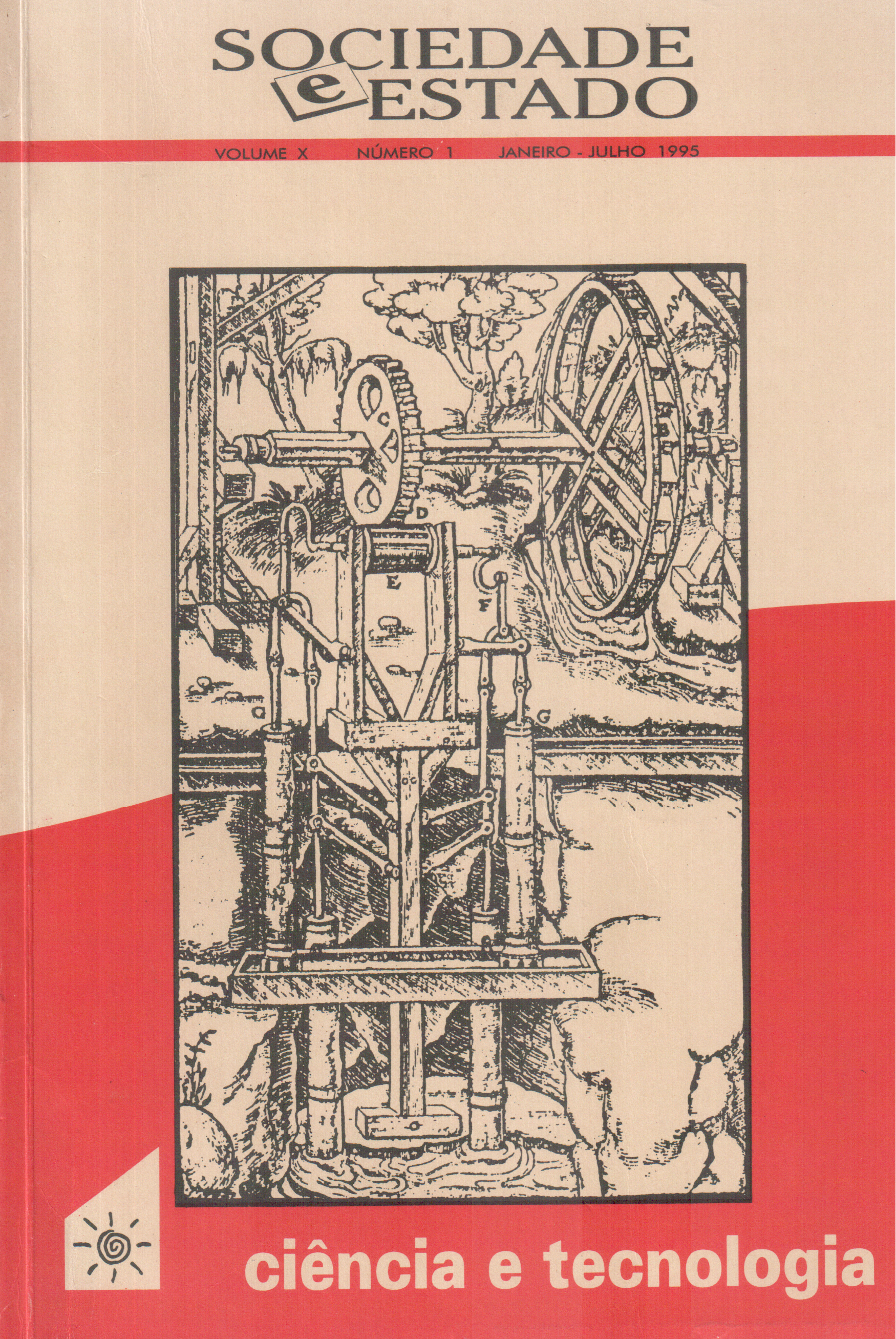Considerações sobre o estudo do futuro
Palavras-chave:
.Resumo
A idéia de futuro, como a conhecemos hoje, é recente na história da humanidade, mas vem adquirindo tanta importância que se tomou motivo de reflexão institucionalizada. Os estudos do futuro tiveram precursores antes do século XX, mas foi a partir da Segunda Guerra Mundial que evoluíram para a atual estruturação e foco de interesse. Presentemente, fundamentam a tomada de decisão pelo setor público e privado, mas em geral oferecem bases teórico-metodológicas obscuras ou nulas. Os paradigmas clássicos das ciências sociais, tais como se constituíram em tomo das obras de Marx, Durkheim e Weber, podem contribuir, cada um a seu modo, para fundamentar o estudo do futuro. O artigo examina também aspectos específicos de outras contribuições relevantes, tais como de Marcuse, Habermas e Mannheim, e os desafios recentes do pós-modemismo, concluindo pela vantagem de uma abordagem heterogênea.
Downloads
Referências
BESTUJEV, Igor V. (1968).“Gli studi sul futuro alFUnione Soviética”. Futuribili, 3 (maio): 105-10.
BLEWETT, Neal. “No end to history?” Australian Journaloflnterna- tional Afffairs, 48 (1): 25-34.
BOROUSH, M. A. (org.) (1980). Technology assessment: creative futures. Nova York, North Holland.
BUILDER, Gari II. (1993) “Is it a transition or a revolution?” Futures, (março): 155-67.
CAZES, Bernard (1992). “Francis Fukuyama ou le dernier philosophe de I histoire”. Futuribles, 169(outubro):33-8.
Ciba Foundation Symposium 36: (1975). The future asan academic discipline. Amsterdam, Elsevier.
CLARKE, A. C. (1970). Perfil do futuro. Petrópolis, Vozes.
CORNISH, E. (org.) (1977). The sludy of the future. Washington, World Future Society.
DRUCKER, Peter (1993). Post-capitalist society. Nova York, Harper.
Economist, The: (25.5.1991). Pp. 23-5.
ELDREDGE (1975). In Ciba Foundation Symposium.
ELLUL, J. (1964). The technological society. Nova York, Vintage.
FUKUYAMA, Francis (1994). “The future of equality”. The National Interest, 38 (inverno): 97-100.
_________ (1992). The endof history and the last man. Nova York. Free Press.
GIERYN, Thomas F. (1995). “Boundaries of Science”. In Sheila Jasa- noff, et al., Handhook of Science and Technology Studies. Thou- sand Oaks, Sage, pp. 393-443
GOONATILAKE, Susantha (1993). “The new technologies and the end of history”. FuturesResearch (fuarterly, 9 (2): 71-93-
HABERMAS, J. (1972). “La ciência y Ia tecnologia como ideologia”. In B. Barnes (org.). Estúdios sobre la tecnologia de la ciência. Madri, Alianza Editorial.
HAWKING, S.W. (1988). Uma breve história do tempo. Rio de Janeiro, Rocco.
HOYOS, A. de. “Future studies in Brazil”. Futures Research Quarterly, 8 (3): 62-75.
INAYATULLAH, Sohail (1994). “Linking the present with the future: the politics of futures research in judicial bureaucracies”. Futures Research Quarterly, 10 (1): 19-29-
--------------(1993). “From ‘who am I’ to when am V?" Futures, 25 (3): 235-53-
JOUVENEL, B. de (1968). A arte da conjectura. São Paulo, Duas Cidades.
KAHN, H. e Wiener, A.J. (1967). The year2000. NovaYork, MacMillan.
KHALILZAD, Zalmay (1995). “Losing the moment? The United States and the world after the cold war”. The Washington Quarterly, 18(2):87-107.
KlIHN, Thomas S. (1970). The structure of scientific revolutions. Chicago, IJniversity of Chicago Press.
MANNHEIM, Karl (1976). Ideologia e utopia. Rio de Janeiro, Zahar.
MARCUSE, Herbert (1972). “Ia racionalidacl tecnológica y la lógica de la dominación”. In B. Barnes (org.). Estúdios sobre sociologia de la ciência. Madri, Alianza Editorial.
MAROVIC, Mihajlo D. e PESTEL, Edouard (1974). Mankind at the turningpoint. Nova York, Dutton.
MARX, Karl (1982). “A produção da consciência”. In O. Ianni (org.). Karl Marx. São Paulo, Ática.
-------------- (1972). The grundrisse. Nova York, Harper.
MASINI, Eleonora B. (1993). “Futures studies and the trend towards unity and diversity”. InternationalSocialScienceJournal, 45 (3): 323-32.
--------------(1990). “On future studies and their social context with particular focus on West Germany”. Technological Forecasting and Social Change, 38: 187-99.
MEADOWS, D. II., et alii. (1974) The limits togrowlh. Londres, Pan.
MERQUIOR, José Guilherme (1992). “Un siècle d histoire brésilien- ne”.Futuribles, 162 (2): 7-13.
MILES, Ian (1993). “Science, technology and futures studies". national Social ScienceJournal, 137: 373-83.
MOLL, Peter (1993). “The discreet charm of the Club of Rome”. Futures, 25 (7): 801-4.
NAISBITT, John e ABURDENE, P. (1990). Megatrends 2000. Nova York, Avon.
NISBET, R. (1985). História da idéia de progresso. Brasília, Edunb/INL.
OGILVY, J. (1992). “Future studies and the human sciences: the case for normaúvescenarios” Futures Research Quarterly, 8 (2): 5-65.
PESTEL, Edouard (1989). Beyond the limits to growth. Nova York, University Books.
QLJIR1NO, Tarcizio R. (1980). A lógica das ciências sociais e o estudo do futuro. Brasília, Grupo Ano 2000. (policopiado)
_________(1975). “A interpretação da educação na sociologia de Max Weber”. Comunicações, 1 (7): 1-11.
RESTIVO, Sal (1995). “The theory landscape in sciencestudies: socio- logical traditions”. In Sheila Jasanoff, et alii., Handhook of Science and Technology Studies. Thousand Oaks, Sage, pp. 95-110.
SLAUGHTER, R. A. (1993a). “ lhe substantive knowledge base of future studies”. Futures, 25 (5): 227-33-
_________(1993b). “Looking for the real megatrends”. Futures, 25 (5): 827-50.
SMITH, J. A. (1988). “Private players in the games of nations”. Tbe Washington Quarterly, Summer.
TOFFLER, Alvin (1981). The third wave. Nova York, Morrow. _________(1970). Future Shock. Nova York, Random. VASCONCELOS, Luis (1992). “La littérature prospective sur le Brésil”.
Futuribles, 162 (2): 29-46.
WEBER, Max (1967) A ética protestante e o espírito do capitalismo. São Paulo. Pioneira.
_________(1951). The religion of China. Glencoe, Free Press.
_________(1986). “A 'objetividade' nas ciências sociais”. In G. Cohn (org.), Coletânea de Textos de Max Weber. São Paulo, Abril Cultural.
YERO, Lourdes (1993). “Futures studies in Latin América”. Interna- tional Social Sciencefournal, 137: 361-71.
ZAHO, Yuezhi (1993) “ l he end of ideology again? The concept of ideology in the era of post-modern theory”. CanadianJournalof Sociology, 18 (1): 70-85.
Downloads
Publicado
Como Citar
Edição
Seção
Licença
Copyright (c) 2022 Revista Sociedade e Estado

Este trabalho está licenciado sob uma licença Creative Commons Attribution-NonCommercial 4.0 International License.











